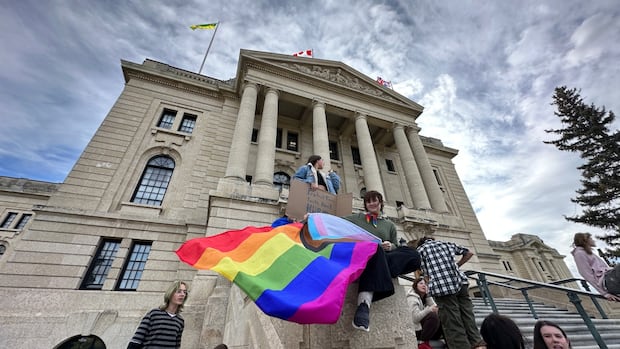SaskatchewanDecision hinged on whether court has jurisdiction to issue a declaration that a law violates sections of the Charter despite the invocation of the notwithstanding clause.Policy requires students to get parental consent before changing pronouns in schoolStudents across the City of Regina walked out of school in October 2023, gathering at the provincial legislature to protest the Saskatchewan government’s controversial pronoun policy. (Kirk Fraser/CBC)Saskatchewan’s Court of Appeal has ruled a challenge to the province’s pronoun law can continue.The law requires parental consent for children under the age of 16 who want to use a different name or pronoun at school.On Monday, the Court of Appeal ruled that litigation over the law can continue at the Court of King’s Bench.It clears the UR Pride Centre for Sexuality and Gender Diversity, an organization at the University of Regina, to argue that the amendments to Saskatchewan’s Education Act violate sections 7 and 15 (1) of Charter of Rights and Freedoms. Those are sections related to freedom of expression and security of the person. That’s despite the province’s use of the notwithstanding clause on challenges related to sections 2, 7 and 15 of the Charter.READ | Court of Appeal Decision – Saskatchewan (Minister of Education) v UR Pride Centre for Sexuality and Gender Diversity: The Court of Appeal found that UR Pride can also amend its challenge to seek a declaration that the policy violates section 12 of the Canadian Charter of Rights and Freedoms, related to cruel and unusual treatment or punishment.This judgment does not determine that the Education Act “operates in a way that limits any person’s Charter rights,” as that issue was not before the court and the government has not conceded that point.However, part of the application seeking to have the policy declared unconstitutional must be struck, the Court of Appeal ruled.Since the policy is now law and there is no “allegation or evidence that any person has suffered harm because of it,” the challenge to the policy is moot, the decision reads.Egale Canada, which is representing UR Pride, welcomed the decision in a news release issued shortly after the decision was published.”The Court of Appeal’s decision upholds the rule of law in Canada and, in particular, reinforces the critical role of the courts in determining the constitutionality of government action,” the statement read.”We urge the government to end its defence of harmful legislation and prioritize creating school environments where all students are safe and welcome.”The Government of Saskatchewan did not immediately respond to a request for comment.The written reasons for the decision were provided by Justice Robert Leurer, with concurrence from Justices Georgina Jackson, Lian Schwann and Jerome Tholl.Justice Neal Caldwell wrote in dissent.How we got hereThe legal battle goes back to August 2023, when the Saskatchewan government announced the pronoun consent policy.Later that month UR Pride filed an application against the new policy, requesting a judge strike down the changes. It said the policy was not justifiable under the Canadian Charter of Rights and Freedoms, and denied gay and gender-diverse students “a safe and welcoming educational environment in which to be themselves.”UR Pride also argued that the policy outed children who weren’t ready to express their new identity to their parents, and that that would potentially put them at risk of harm.The province then passed The Parents’ Bill of Rights in October 2023, writing the policy into law and employing the notwithstanding clause — a rarely used measure that lets governments override certain Charter rights for five years.The province then applied to have UR Pride’s challenge dismissed.In response, UR Pride amended its legal challenge to say that the law violates Section 12 of the Charter, which protects Canadians against cruel and unusual treatment or punishment. The province did not name Section 12 when it invoked the notwithstanding clause.In a Feb. 16, 2024 decision, Court of King’s Bench Justice Michael Megaw ruled in favour of UR Pride, allowing it to make its case on the constitutionality of the new pronoun rules, despite the use of the notwithstanding clause.The Government of Saskatchewan appealed that decision, saying its invocation of the notwithstanding clause nullified Megaw’s jurisdiction.The Court of Appeal heard arguments over two days in September 2024. Intervenors included representatives from Amnesty International, the Canadian Civil Liberties Association, and the New Brunswick and Alberta governments.It then reserved its decision. Now, the decision given Monday has paved the way for UR Pride’s challenge to be heard.ABOUT THE AUTHORAlexander Quon has been a reporter with CBC Saskatchewan since 2021 and is happy to be back working in his hometown of Regina after half a decade in Atlantic Canada. He has previously worked with the CBC News investigative unit in Nova Scotia and Global News in Halifax. Alexander specializes in municipal political coverage and data-reporting. He can be reached at: alexander.quon@cbc.ca.FacebookTwitter
Appeal court rules litigation of Sask. pronoun policy can continue











